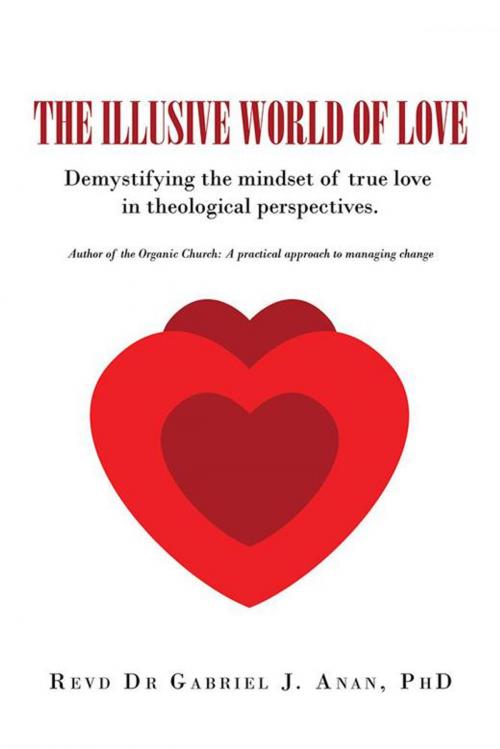The Illusive World of Love
Demystifying the Mindset of True Love in Theological Perspectives
Nonfiction, Religion & Spirituality, Inspiration & Meditation, Inspirational, Spirituality| Author: | Revd Dr Gabriel J. Anan | ISBN: | 9781504988513 |
| Publisher: | AuthorHouse UK | Publication: | August 17, 2015 |
| Imprint: | AuthorHouse UK | Language: | English |
| Author: | Revd Dr Gabriel J. Anan |
| ISBN: | 9781504988513 |
| Publisher: | AuthorHouse UK |
| Publication: | August 17, 2015 |
| Imprint: | AuthorHouse UK |
| Language: | English |
This book attempts to demystify the complexity of the illusive world of love, labeled by the ancient Greeks in the three distinct types of love, particularly eros. The book is challenging this axiom in stressing that majority of people in the world are being fooled into thinking that there is such a thing as true love, as eros. People may say, Not another book on loveyes, but with a difference. The belief is that the word love (eros) is an illusion, and that having been entrenched in the certainty of what love has to offer, the more knowledge we have about it, the better. The instance here is this: whilst love is held with higher regard in the world since time immemorial, it is time to have a fresher thought about the reality of love. By engaging in the exploration of the influence of eros (love), we shall be in a supreme position to be able to disentangle the mind-set being enculturated into society centuries ago by the Greek philosophers. It cant be stressed highly enough as we are all witnessing the devastating impact of the Platonic love eros on many innocent people, particularly children in our modern society. Marinoff claims that the ancient Greeks, whose development and discoveries in many subjects continue to exert primary influence on Western civilization, and therefore also on the global village, were vitally interested in love and its relation to the human soul. In this pre-Christian period, the Greeks were pagans, and the view of the soul was not a religious one involving spirits or ghosts. Plato and others conceived of love as residing in the soul and the soul itself (and therefore love). This book reveals what true love is in the Bible, contrary to what the ancient Greeks handed to modern society. The Greeks third and highest form of love is agape. It is the rarest and most valuable kind of love. Agape is unselfish; its expression always helps and never harms another. What makes agape different from eros and philos is its selflessness. Although agape love was mentioned by the Greeks, its true meaning is given by Jesus in the Bible. In this respect, the book is saturated with the biblical verses of Gods love, particularly agape love.
This book attempts to demystify the complexity of the illusive world of love, labeled by the ancient Greeks in the three distinct types of love, particularly eros. The book is challenging this axiom in stressing that majority of people in the world are being fooled into thinking that there is such a thing as true love, as eros. People may say, Not another book on loveyes, but with a difference. The belief is that the word love (eros) is an illusion, and that having been entrenched in the certainty of what love has to offer, the more knowledge we have about it, the better. The instance here is this: whilst love is held with higher regard in the world since time immemorial, it is time to have a fresher thought about the reality of love. By engaging in the exploration of the influence of eros (love), we shall be in a supreme position to be able to disentangle the mind-set being enculturated into society centuries ago by the Greek philosophers. It cant be stressed highly enough as we are all witnessing the devastating impact of the Platonic love eros on many innocent people, particularly children in our modern society. Marinoff claims that the ancient Greeks, whose development and discoveries in many subjects continue to exert primary influence on Western civilization, and therefore also on the global village, were vitally interested in love and its relation to the human soul. In this pre-Christian period, the Greeks were pagans, and the view of the soul was not a religious one involving spirits or ghosts. Plato and others conceived of love as residing in the soul and the soul itself (and therefore love). This book reveals what true love is in the Bible, contrary to what the ancient Greeks handed to modern society. The Greeks third and highest form of love is agape. It is the rarest and most valuable kind of love. Agape is unselfish; its expression always helps and never harms another. What makes agape different from eros and philos is its selflessness. Although agape love was mentioned by the Greeks, its true meaning is given by Jesus in the Bible. In this respect, the book is saturated with the biblical verses of Gods love, particularly agape love.















